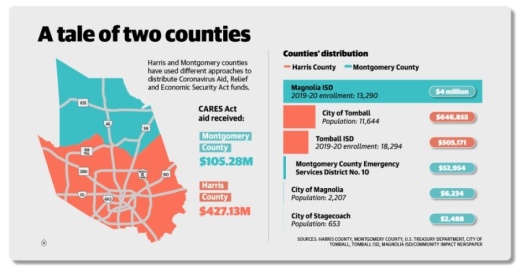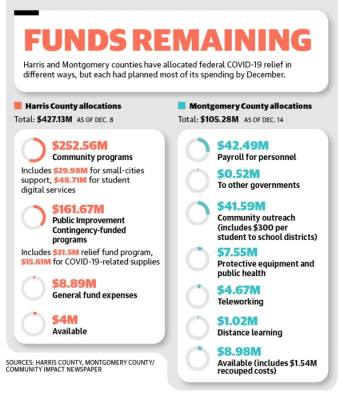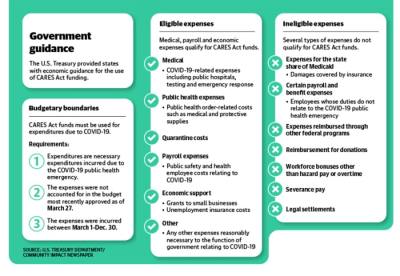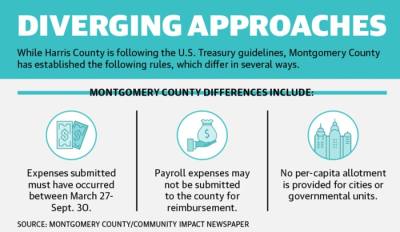However, the counties have differed in how they have distributed the funds.
According to guidance from the U.S. Treasury Department, counties with populations of more than 500,000 can—but are not required to—distribute funds to cities and other governmental entities within their boundaries, such as emergency services districts. This includes both counties.
Harris County is following U.S. Treasury recommendations with a $55 per-capita reimbursement to local governmental units for expenses incurred through Dec. 30, including payroll costs for public safety employees. Elsewhere in the state, Travis, Dallas and Fort Bend counties are also offering proportional amounts based on population.
Unlike Harris County, Montgomery County has prioritized funding for public school districts from its CARES Act allotment. Additionally, Montgomery County is reimbursing expenses from March 27-Sept. 30 and is not including a per-capita allotment or payroll costs. During a Dec. 15 meeting, commissioners agreed 3-1 to allocate the county’s remaining $8.9 million to cover public safety expenses through the first quarter of 2021. Any funds not used by Dec. 30 will have to be returned to the federal government, officials said.
Careful spending
While Montgomery County has put its federal dollars toward medical and public health expenses, community outreach programs and local school districts’ needs during the pandemic, county officials said in November they would rather send the remaining funds back to the U.S. Treasury than use them incorrectly.The county was awarded $105 million in federal CARES Act funds to be used for expenses incurred due to COVID-19. Local officials said they must be careful with spending CARES Act money to make sure it meets U.S. Treasury guidelines, or they could be subject to a claw back—meaning the county would have to repay the money to the U.S. Treasury.
“If we use it incorrectly, we’re going to have to issue debt to get it back, and the federal government will take it, go into our bank account, and we’ll have to fill it in on the back end,” Precinct 3 Commissioner James Noack said in a Nov. 12 phone interview prior to the county’s approval of the remaining CARES Act Aid, to which he dissented Dec. 15.
A previous proposal in June from Noack to provide $500 to many county residents in stimulus money from the CARES Act funding was dialed back after county officials learned the program might not be deemed directly related to COVID-19 relief.
In Harris County all but $4 million of its $427 million in CARES Act funds had been allocated as of Dec. 8, according to the budget management department. At a Dec. 15 meeting of the Harris County Commissioners Court, Budget Director Dave Berry said the county was on track to have all funds allocated before the end of the year, meaning no money would have to be refunded.
“I think we are in as good of shape as we possibly can be,” Berry told commissioners. “We have a base plan that uses the $427 million and backup plans should we have any issues.”
Local governments
Montgomery County Judge Mark Keough said in an email he believes the “vast majority” of cities and entities have had no or little expenses related to COVID-19 because the county has been supplying personal protective equipment and other supplies. However, 12 entities requested reimbursements for a total not to exceed $507,981.Magnolia Police Department Chief Kyle Montgomery said as a result of the county’s supplies, the city’s pandemic-related expenses have totaled only about $6,200 for public safety and sanitation measures, such as masks, hazmat suits and sanitation supplies.
“The office of emergency management for the county has been really good. If there were things that we needed, ... any kind of resources that we’re lacking, they’ve been really good at helping us out,” Montgomery said. “From our agency’s [perspective], there’s not anything I think [the county] could do differently to help us.”
On Dec. 8, commissioners approved authorizing all or part of these expenses, granting the city of Magnolia $6,234; the city of Stagecoach $2,488; and Montgomery County Emergency Services District No. 10, which contracts with the Magnolia Volunteer Fire Department, $52,954.
Gary Vincent, the chief of the fire department, said the request includes expenses such as two disinfecting fog machines to clean the fire trucks and stations as well as personal protective equipment, sanitizer and cleaning supplies.
“We’re still expending funds at a rapid rate to try to fight COVID, so this all helps to try to get reimbursed so we can use the money again to help on other fire department needs,” Vincent said. “Without the proper equipment, it’s not possible for us to do our job in helping people, so we greatly appreciate having the funding to do the supplies and things, because COVID is a very large expense that is ... not a normal routine expense.”
Stagecoach City Secretary Brenda Rutt said the city’s request included reimbursements for two air purifiers, disposable gloves, face masks, cleaning supplies and a computer for a second work station in the police department.
While the cities of Magnolia and Stagecoach filed requests with Montgomery County, the city of Tomball received a $646,855 lump sum for pandemic-related expenses from Harris County, calculated according to the city’s population, City Manager Rob Hauck said in an email.
Much-needed relief
Harris County did not make a specific funding allocation per student for school districts, although $33.71 million of the county’s CARES Act funds has been designated for student digital services.According to Tomball ISD, the district has received a commitment from Harris County for $505,171, which covers TISD’s purchase of more than 4,300 Chromebooks and internet hot spots through the state’s bulk purchase program.
Montgomery County has put about a third of its funds toward school districts instead of assigning a per-capita allotment to local governments, with $34.46 million slated.
The districts—Conroe, New Caney, Splendora, Willis, Magnolia and Montgomery ISDs—will receive a total of $300 per student in CARES Act funds for expenses relating to COVID-19 after a Nov. 17 Commissioners Court decision.
The amount was an increase from $40 per student originally adopted by the court at its Oct. 27 meeting, or $4.4 million total. Commissioners have also approved more than $1 million to purchase remote learning devices for local school districts.
“It’s important to this court that we use this money in a way that it was intended and that it provides the most benefit, and there’s no better place to put it ... then back into schools and our kids and to the future of Montgomery County,” Noack said at the meeting.
Erich Morris, Magnolia ISD assistant superintendent of operations, said the district received approximately $4 million in CARES Act funding from Montgomery County.
“All pandemic-related expenses to date were absorbed within the district’s normal operating budget,” Morris said in a Dec. 8 email. “The strain on the district’s budget will be greatly minimized thanks to the efforts of Montgomery County.”
The district’s costs have included student Chromebooks and tablets, supplemental pay given to teachers for distance learning efforts and cleaning supplies, Morris said.
“The funds help better position the district for possible COVID-related state funding cuts next biennium,” Morris said in an email. “Time will tell what the Texas public school funding picture will look like for the next two years given the economic downturn.”
Andrew Christman contributed to this report.










